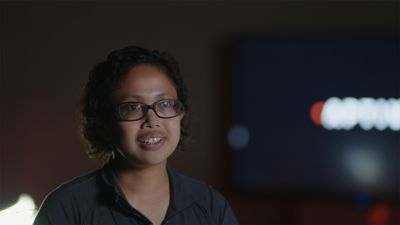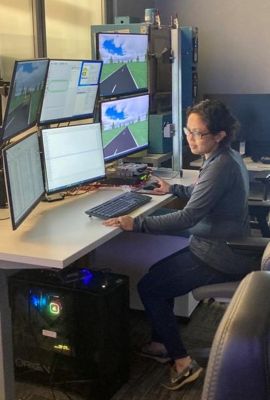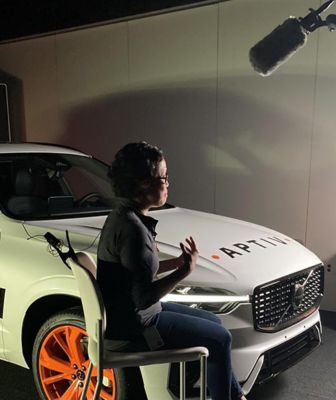ANSYS BLOG
November 29, 2023
Women in Technology — Making the World a Safer, More Equitable Place
Learn how Aptiv's Lisa Savage is leveraging her automotive expertise to help build safer vehicles and encourage women to pursue careers in STEM
Today, it’s understood that women in technology perform just as well as their male counterparts. Regardless, we’re still experiencing a science, technology, engineering, and mathematics (STEM) gender gap, as women represent just 34% of the total workforce in STEM, of which 16.5% are engineers and architects. One reason is that from a young age, women are often steered away from math and science in favor of other career paths.
Despite the challenges, Lisa Savage pursued her dreams and assumed a prominent role in automotive engineering, as safety technical lead for safety of the intended functionality (SOTIF) and artificial intelligence/machine learning (AI/ML) at Aptiv.

Lisa Savage, Safety Technical Lead (SOTIF and AI/ML) at Aptiv
After completing a video shoot for the Ansys online docuseries "Driven by Simulation," we had a chance to talk to her about her career, how Ansys software informs her work, and how she’s supporting and encouraging young women to follow her path.
Question: Could you share a bit about your background, and how it prepared you for a career in automotive?
Lisa Savage: I got my start in engineering back in high school on the robotics team. Through robotics, I realized how fun creating products was. I realized that I could design things to make people's lives better. So, I ended up going to college for mechanical and aerospace engineering.
After graduation I spent some time in defense, space, medical, and consumer goods as both a mechanical and a robotics engineer before landing in the automotive space. I love automotive engineering because there are so many different opportunities to work on new technology. I've been involved with the design of advanced driver assistance systems, or ADAS, and also automated driving products in both systems engineering and safety engineering roles.
Now I’m putting this experience to work as a safety technical lead at Aptiv in our global product organization, specifically on SOTIF and safety of AI related to automotive applications.

Lisa Savage presenting on automotive safety

Part of Lisa Savage’s position involves work developing scenarios for testing Aptiv’s features in the simulation space.
Q: What inspires you to come to work every day?
Savage: Crash statistics are still really, really bad, much due to human error and environmental factors. I want to be able to decrease the number of crashes so that more people can return home to their loved ones. That was the critical piece that drew me to the automotive space, especially with so much technological advancement happening.
I really like Aptiv because we are working on products that will make people's lives better, safer, greener, and more connected. That's a big piece for me. I never feel like I’m stagnating in my role because there are always new challenges to solve or problems to fix.
Q: How did you find out about Ansys software? What products are you using currently?
Savage: I actually first used it in college. I used a little bit of Ansys LS-DYNA and Ansys Fluent in both my coursework and project work. After graduation, I started out in my career dabbling a little bit in Ansys Zemax OpticStudio with optics and laser systems.
In my current safety role, I work with Ansys medini analyze. We use medini to do analysis, be it a hazard analysis, risk assessment, fault tree analysis, or failure mode and effects analysis. It enables us to really dive down into what exactly we need to implement to make sure that our product is safe within certain circumstances.
Q: What impact is medini having on safety analysis at Aptiv?
Savage: I’m part of a team responsible for creating the core solutions for safety. We prepare the products that can then be used with and tailored for customers further down the line.
Medini is central to establishing the requirements that are needed, or to fully define the operational design domain in which our products are operating. It ensures that I'm decently covering the space that we're working in. Most recently I've been working through some fault tree analyses to understand, from a statistical standpoint, how likely unwanted system behavior is to happen, and whether or not it is acceptable.
Q: So, we’re going to shift gears here a bit and talk about what it’s like to be a woman in tech. What have you experienced during your engineering career?
Savage: I think that we have, as a society, made a lot of progress recruiting women to STEM, and to engineering in particular. I've been pretty fortunate to not have experienced too much outright sexism in the field. That said, I do think that there are still a lot of unconscious biases out there, even at the youngest levels, causing girls to drop interest in STEM before they even make it to the industry. It's super important to me, personally, that I do what I can to grow and foster an interest in STEM in our youth.
Personally, I have been in situations where I've been second-guessed more than my male counterparts, or where my work was attributed to someone else — even though I might have had the just as much if not more experience than others in the room. During moments like these, I had to find my voice and stand up for myself. Of course, I’m aware that might be happening to other women as well, and I try to support them where I can so that I can make sure that their voices are heard, too.

Lisa Savage was interviewed for an upcoming episode of the Ansys docuseries "Driven by Simulation."
Q: How are you supporting women in your field?
Savage: I’m part of Aptiv’s Women's Network and Aptiv’s Technical Women's Network, both at the local and global levels. We bring each other up and support each other professionally through mentoring, training, and upskilling. Currently I have a mentee, and I also lead Aptiv FIRST, which works to provide STEM mentorship to students from grade school all the way up through high school.
Something else I’ve had the opportunity to kick off since I started here at Aptiv is an apprenticeship program targeted towards giving young adults the opportunity to break into the technology space. There are a ton of young women who just might not have had the opportunity to get a technical degree, and the partnership program is their way to get that training and get involved with the automotive industry.
I am proud to have mentored kids in STEM, individually or as part of a student team. Seeing them find their passion and forge their career path has been really rewarding. Some of them go on to get advanced degrees in engineering; many take what they’ve learned to change the world. It’s very rewarding to see.
Q: What would you say to young women who are looking for career in automotive engineering?
Savage: Never stop exploring. Always try to understand more about the world around you. The reason that I am where I am now is because I kept exploring, always looking at different industries and different products and trying to understand how exactly they worked. Even though I graduated with my degree in mechanical and aerospace, I stayed really hungry and tried to learn more about the electrical and the coding spaces, for example.
Lisa Savage Lends Her Star Power to Driven by Simulation
We wanted to thank Lisa for sitting down with us to do a great interview after a long day of filming for "Driven by Simulation," our online docuseries. You can see her, and some of her team members in an upcoming 2024 episode. And while you’re waiting, you can catch up on all of the latest episodes of "Driven by Simulation."